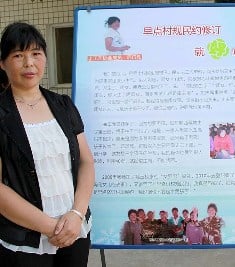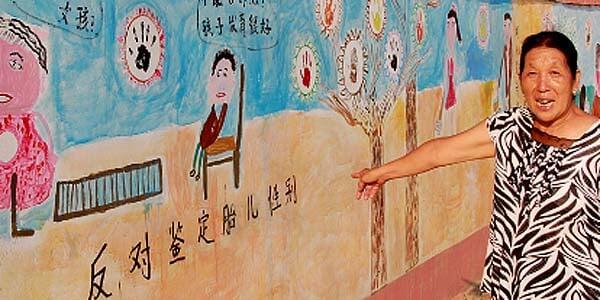ZHOUSHAN, Henan, China- After suffering pressure from her husband and father-in-law, Qiaofang eventually managed to have a son. The young mother already had two beautiful girls, but in China a combination of strong traditional values and community laws can influence families and women to do almost anything to have a son.
Qiaofang was “lucky” and her third child was a boy. However, the decision had health and economic consequences that she is still suffering today. “If the old regulations of my village had treated girls and boys equally, I would definitely not have chosen to have another child,” she says.
Qiaofang tells her story to a group of visitors interested in learning about her small village’s experience in attempting to tackle the root causes of son preference. The case of Zhoushan is being studied by “party school” teachers from who train government officials, with a hope of using the lessons learned here in other provinces with high imbalances in the sex ratio at birth (SRB), like Anhui, Jiangxi and Shaanxi.

The preference to have a son is deeply rooted in traditional Chinese society and in some regions there are as many as 127 male births for every 100 female births (2010 National Census) , when the normal biological level is 104-106. The SRB in the province of Henan is one of the highest in China, with more than 120 boys born for every 100 girls.
This preference of sons over daughters is changing in some places, and Zhoushan is one of them. These teachers were visiting Zhoushan to see how changes have taken place.
Identifying root causes of son preference
In 2008, with support from UNFPA and others, the Women Studies Centre of the Central Party School undertook a study intended to show the root causes of skewed sex ratio at birth in China.
In interviews conducted by the research team, almost all the participants agreed to two commonly perceived benefits of having boys: to secure old-age support—sons rather than daughters are expected to provide support to their parents through their lives—and to guarantee the continuity of the family line—only sons are able to carry on family names and inherit family properties.
These beliefs have shaped the cultural norms of Chinese society for thousands of years, and they are still strongly rooted today, affecting people’s behaviour in spite of many changes intended to promote gender equality at all levels.
In some rural areas discriminatory village regulations may be contributing to the skewed sex ratio at birth. For example, many villages don’t allow married or divorced women the same entitlements, such as rights to land, that other villagers enjoy.
To address this problem, village leaders in Zhoushan volunteered to take part in a pilot project to make regulations more gender equitable and change long-standing practices contributing to son-preference.
The first step was to create awareness and support from the villagers. With support from the local government, two weddings of men marrying into their wives’ families were celebrated as the major events in the village with the presence of prominent figures from the city including officials.
Traditionally, village marriages are patrilocal – that is, the wife moves in with the husband’s family. When it is the other way around, weddings are normally held quietly and unblessed because of the perceived lower status of women ,and lower status of families without sons.
At these two reformed weddings in Zhoushan, the brides proudly welcomed their husbands into their homes. Neighbours were pleasantly surprised by the change from the traditional custom, and both brides and bridegrooms received heart-felt congratulations from the onlookers.
Promoting women’s participation in the process
In March 2009, with the support of researchers from the Central Party School and NGO workers from Henan Community Education Research Centre, residents of Zhoushan held serious discussions on the regulations that had governed their village for many years. These discussions led to groundbreaking actions to promote women’s participation in representative institutions and to guarantees of equal economic entitlements to men and women. There were also efforts to encourage men to share household chores and care for elderly relatives.
“We were amazed to see that the process went so well, and this was because the motivation came from the villagers, especially from women,” explains Liang Jun, an NGO leader who actively mobilized women to take part.
For Qiaofang some of the most important changes were the ones that recognized the equal status of boys and girls, the freedom of marriage for both men and women, and the equal entitlement of women to land and other properties.
The success in Zhoushan inspired several other villages in Henan province to tackle root causes of son preference, and led to a government-supported initiative in the nearby city of Dengfeng city.
“I never realized that my school could play a key role in facilitating such radical changes,” said visitor Xiao Hong from the Shaanxi Party School. Having seen that party schools can act as a venue to promote gender awareness among both grassroots-level and senior officials, Ms. Xiao and the other observers were eager to integrate gender topics into their schools’ training courses to influence government officials. The Central Party School will continue to advocate for inclusion of gender issues in the national party school curriculum.
Traditional value systems favouring sons have contributed to imbalanced sex ratios at birth in a number of Asian countries. A report published recently by the UNFPA Regional Office for Asia and the Pacific estimated a gender gap in 2010 of 117 million “missing” women in the region’s population, most of them in China and India.
UNFPA promotes legislative efforts and advocacy to reduce discriminatory attitudes and practices related to son preference by ensuring women’s equal political participation and rights to inheritance, employment, pensions and credit, and by enforcing bans on sex-selective procedures.
Key breakthroughs achieved in the reform of village regulations in Zhoushan
- Promoting women’s participation in village affairs by mandating a minimum proportion of women in village leadership bodies.
- Promoting equal economic entitlements to anyone who is divorced or survives the death of a spouse, whether male or female.
- Promoting reform of the traditional patrilocal marriage pattern by respecting “freedom of marriage” and supporting weddings regardless of whether women are marrying into husbands’ families or vice versa, and by allowing government support to funerals of daughter-only families.
- The revised regulation also include provisions promoting diversified old-age care, reform of conventions for naming sons, and encouraging men to share household chores.
By Gao Cuiling


